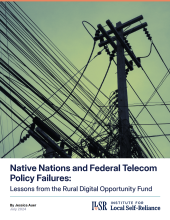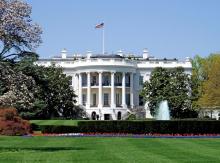New Report: Native Nations and Federal Telecom Policy Failures: Lessons from the Rural Digital Opportunity Fund
A new report published today by the Institute for Local Self-Reliance (ILSR) reveals how the sovereignty of Tribal Nations and their own efforts to solve connectivity challenges on Tribal lands can be undermined by the poor design and maze of bureaucracy associated with some federal broadband programs.
The report – Native Nations and Federal Telecom Policy Failures: Lessons from the Rural Digital Opportunity Fund [pdf] – begins with a startling example of how one Tribe learned about the plans of a major fiber Internet provider to serve “a handful of locations in the heart of the Tribal Reservation.”
Authored by Dr. Jessica Auer, Tribal Broadband Policy Analyst with ILSR’s Community Broadband Networks initiative, the report captures the pernicious consequences of a program that was supposed to help bring high-speed Internet service to rural communities who lacked access:
A non-Tribal telecommunications company had received federal funding to build broadband infrastructure on Tribal lands without consent, had appeared to shirk required federal Tribal engagement requirements, had ignored the Tribe’s attempt to raise concerns about it, and now seemed to be expecting to dictate what would happen next.
While the report begins with a real-life example of how Tribal nations now working to build their own broadband networks can be blindsided by bureaucratic neglect and non-Tribal ISPs, it goes on to detail why the FCC’s approach to broadband funding has fostered tension between providers and Tribal ISPs, and why RDOF has earned a particularly bad reputation among many Tribes.
“Some recent federal broadband programs do actually require ISPs to secure Tribal consent prior to receiving funds,” Auer says. “But, the FCC still has not adopted this approach. The problems outlined in this report reinforce the need for such a requirement.”



